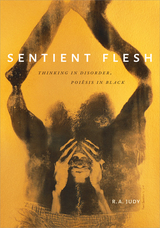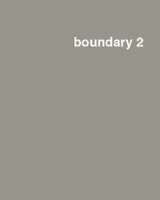
Several essays in this collection focus on an area of Ellison’s thinking that has yet to be adequately scrutinized—his study of, and writing about, music, specifically jazz and the blues. Although not a systematic philosopher of music, Ellison exhibited the seriousness and rigor associated with the critical musical writings of Theodor Adorno and Edward Said. Other essays in this special issue examine salient questions raised by Ellison’s work, including the nature of the connection between the novel and the democratic mind, Vietnam and the crisis of liberal society, and the problematic of modernism and freedom. Ralph Ellison addresses the ways in which Ellison’s writings about art were also efforts to think about and discuss political agency.
Contributors. Jonathan Arac, Kevin Bell, Adam Gussow, Ronald A. T. Judy, Robert O’Meally, Donald E. Pease, Barry Shank, Hortense Spillers, Kenneth Warren, Alexander G. Weheliye, John Wright


Spanning a wide array of disciplines, from German studies and sociology to literary criticism, philosophy, and anthropology, with contributions from some of the most outstanding scholars in these fields, Sociology Hesitant contributes to the recognition of DuBois as an important historical figure by focusing on the complexity of his theoretical work. These essays offer an extended interaction with the ideas and projects DuBois formulated in a series of essays written between 1887 and 1910 that take up intricate questions concerning the nature of methodology and the theory of knowledge. Using DuBois’s work as a point of departure, contributors explore current thinking about diverse subjects such as geopolitics and postcolonialism. Demonstrating that engaging the question of race requires rethinking the historical nature of theoretical understanding, this collection brings to light the notion that the struggle for equality is a struggle for freedom of thought in pursuit of truth.
Contributors. Kenneth Barkin, Nahum Chandler, Ronald Judy, David Krell, Charles Lemert, Sieglinde D. Lemke, Tommy Lott, Kevin Miles, Abdulkarim Mustapha, Ken Warren
READERS
Browse our collection.
PUBLISHERS
See BiblioVault's publisher services.
STUDENT SERVICES
Files for college accessibility offices.
UChicago Accessibility Resources
home | accessibility | search | about | contact us
BiblioVault ® 2001 - 2024
The University of Chicago Press









